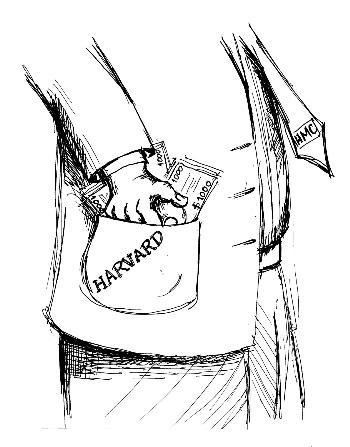
News
Summers Will Not Finish Semester of Teaching as Harvard Investigates Epstein Ties

News
Harvard College Students Report Favoring Divestment from Israel in HUA Survey

News
‘He Should Resign’: Harvard Undergrads Take Hard Line Against Summers Over Epstein Scandal

News
Harvard To Launch New Investigation Into Epstein’s Ties to Summers, Other University Affiliates

News
Harvard Students To Vote on Divestment From Israel in Inaugural HUA Election Survey
On Payoffs, Layoffs and Harvard Inc.
This administration needs to get its priorities straight

There are some things that even the wealthiest of the wealthy can’t get away with. Martha Stewart and the boys at Enron learned that the hard way. So this spring, Harvard decided to take it down a few notches in our own back-Yard with compensation caps for the board of the Harvard Management Company (HMC) and increased aid for low-income students. But it has not done enough.
This year, we watched the earnings of the highest-paid Harvard managers go through the roof—and perhaps a dirty chimney or two—to over $107.5 million. Vocal objections from the class of 1969 followed, and were amplified by their upcoming reunion and their financial leverage—coveted contributions to the $19 billion cause that is Harvard’s endowment. The HMC, the in-house “not-for-profit” that has handled the University’s lucrative investments since 1974, proceeded to realize the error of its ways, and announced the (as-yet-unspecified) caps on its top managers’ earnings.
These caps must be just the beginning. The fact is multimillion-dollar money managers get to choose where, and whether, to work or not. Yet those who keep this place running, who manage the day-to-day happenings of the University—instead of billions of dollars that students will likely never see—don’t have such a choice. And this year, over 200 of them heard that mass layoffs, inevitably accompanied by economic insecurity and family instability, await them next month.
What Harvard has done, aside from turning the lives of hundreds of hardworking families upside down, is validate the practices responsible for the jobless recovery we’ve seen nationwide. Even with the value of the endowment jumping 12.5 percent this year back to its pre-recession levels, the Corporation has continued to impose conditions that require extra cost-cutting—a budget crunch of its own making—starting with vulnerable employees and the valuable services they provide to the University community. Then, Harvard squeezed the rest out of its students, raising tuition 5 percent without a reasonable explanation of why.
In short, both working families and students are taking it in the chin this year. It’s not that the money isn’t there. Rather, some of the most powerful people at Harvard seem to be making the overriding purpose of the institution to accumulate more of it, and to guard Harvard’s place at the top of the market-educational complex.
University President Lawrence H. Summers likes to claim that the priority here is on creating an environment that ensures academic excellence. If this were really the case, HMC would be putting more than the 4 percent (initially 2 percent) payout pittance into University funding this year. Budget cuts in already-limited student services would be the last thing on administrators’ minds. And $107.5 million certainly would not be going to those whose only job is to further fatten the company’s coffers.
There are reforms for which the administration should be commended this year—joining the Workers’ Rights Consortium, conceding the need for compensation caps and reducing the contributions required of students from low-income families.
Yet students and alumni, faculty and workers cannot be satisfied until administration and management get their priorities straight. Until then, we’re all justified in asking: Is Harvard today in the business of providing the best education possible? Or is Harvard just in business?
Michael Gould-Wartofsky ’07, a Crimson editorial comper, lives in Thayer Hall.
Want to keep up with breaking news? Subscribe to our email newsletter.
